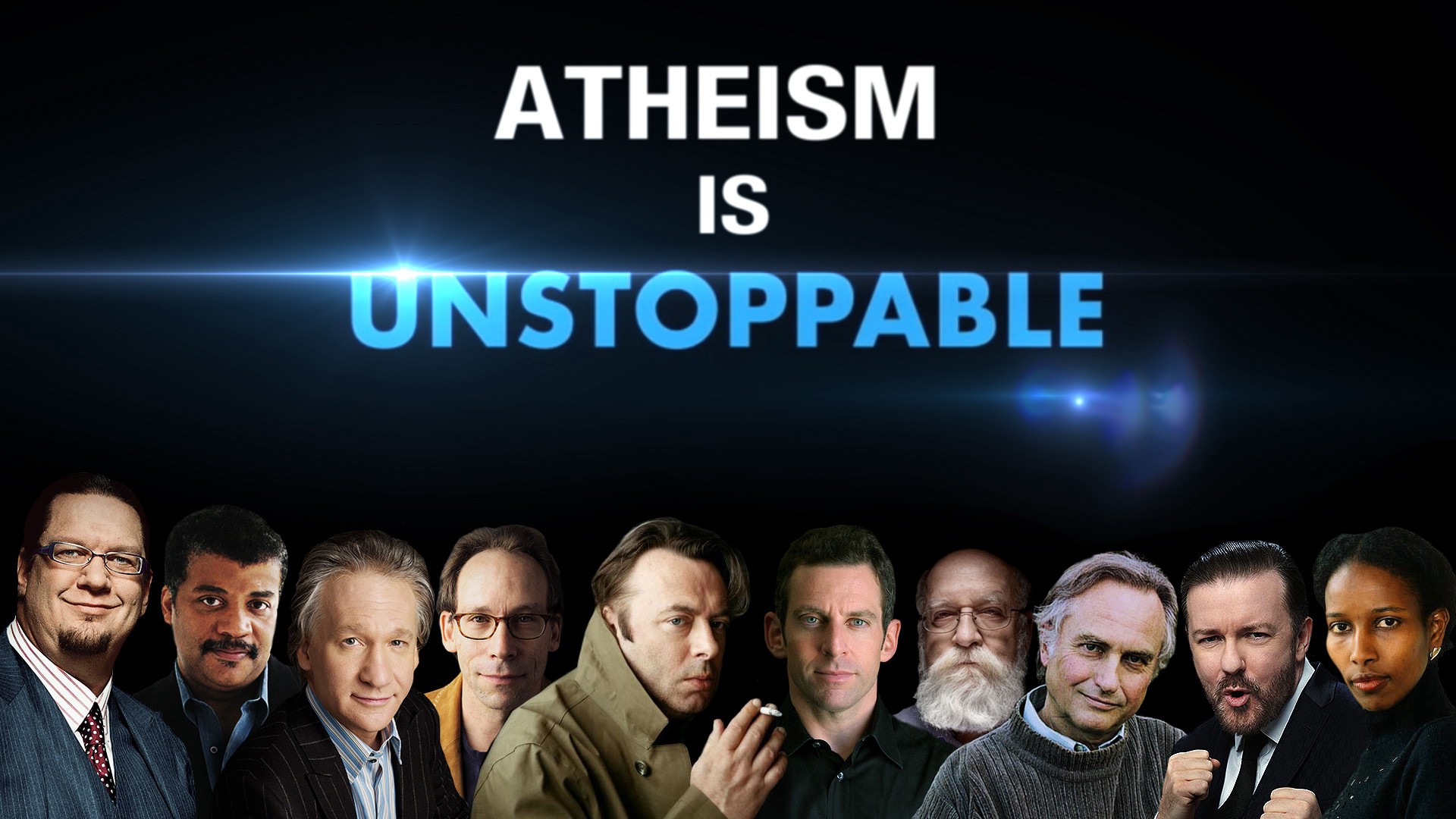No Sex Please, We’re Atheists
Benjamin FreelandFollowApr 6, 2018 · 18 min read
Religious fundamentalists think we’re a bunch of shameless libertines. If only that were true.
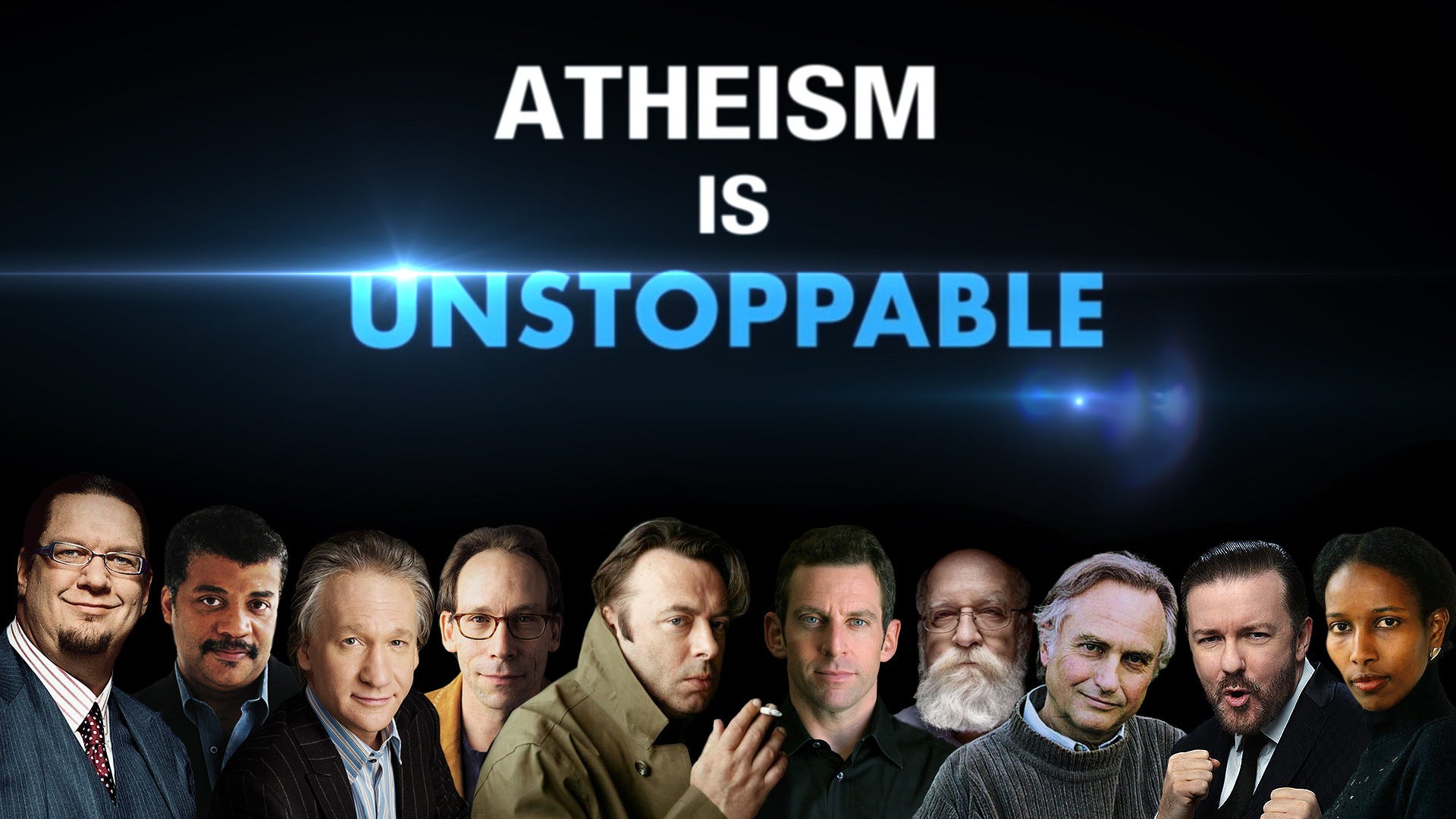
I’ve long been a fan of the late Christopher Hitchens, but it wasn’t until recently when I delved deep into his essay collection Arguably, published three months before his death in September 2010, that I truly came to realize what the world had lost upon his shedding of his mortal coil.
Those of my generation and younger know Hitch mainly as one of the so-called “four horsemen” of the new atheist apocalypse (or non-apologist as fellow nouveau-skeptic Michael Shermer called the phenomenon) together with Richard Dawkins, Sam Harris, and Dan Dennett, and remain largely oblivious to his long career as a bad-boy foreign correspondent, literary critic, and columnist for the likes of Vanity Fair and New Statesman.
The man who famously had himself subjected to waterboarding during the Bush II era so as to determine whether or not it constituted torture (spoiler alert: yes, it did) was also, in another life, a daredevil Trotskyite journalist who interviewed Latin American despots, got himself locked up in communist Czechoslovakia, and was one of the earliest and most most vocal Cassandras about the incipient post-Cold War menace to freedom of expression presented by religious (and particularly Islamic) extremism stemming from the 1989 fatwa against his friend Salman Rushdie. In other words, there was a sexy swashbuckling badassness to Hitchens that is notably absent from his fellow three “horsemen”.
He was also the only horseman who exuded much in the way of libido or actually talked about sex on a regular basis. For those unacquainted with his more risqué writings, I recommend his deliciously pervy 2006 Vanity Fair article “As American as Apple Pie” in which he lovingly recounts the uniquely American history of the blowjob. It’s hard to imagine any of the other three horsemen writing something like this. Sure, Dawkins talks about sex acts, but more or less entirely within the context of Darwinian processes. I don’t think I’ve ever heard Dennett talk about sex, and as for Harris one sometimes gets the sense that he’s spent rather too much time under the tutelage of celibate monks and equally chaste academics, because any time any of his podcast guests veer into sexually provocative territory (most hilariously in his conversation with AI theorist Kate Darling in #66 “Living with Robots” and a candid discussion of “child sex robots”) he seems to get positively squeamish.
Yes, that chain-smoking, hard-drinking old satyr of the New Atheism — that strange hybrid of Charles Bukowski and Oscar Wilde — was a different creature, and a throwback of sorts to a time when being an atheist had a sort of risqué sex appeal to it. It wasn’t that long ago that the “famous atheists” in the public sphere (think Mark Twain, Harry Houdini, Simone de Beauvoir, Jean-Paul Sartre, Katharine Hepburn, Henry Miller, Anaïs Nin, Langston Hughes and others) were the type of people you would probably want to have sex with after a night of boozy conversation. This may also have something to do with the fact that the political left was once much sexier than it is now, but today’s atheist talking heads are positively chaste and boring by comparison.
I thought we were the ones who were supposed to be having sex parties and committing all manner of sins of the flesh. How come any time you hear about some sex scandal it’s usually religious people at the centre of it? It certainly begs the following question: are people of faith having more, better, and dirtier sex than nonbelievers? On this question I’m reminded of a quote by filmmaker John Waters, who famously said “I thank God I was raised Catholic, so sex will always be dirty.” Perhaps he has a point.
Sexual prudishness: no religion required
Discussions of sexual repressiveness and stunted sexual development tend to centre on religious upbringing, and for good reason. I would definitely argue that most, if not all, of our strange hangups when it comes to human sexuality, whether it’s latent homophobia, fear of female sexual appetite, or our slavish obsession with strictly monogamous pairings, are the product of religious programming. Few if any religions are good when it comes to sex. Some are clearly worse than others, but even nice religions like Buddhism, Jainism, Baha’i, and Quakerism retain a certain fixation on sexual purity that we would probably all be better without.
Clearly secular culture can — and should — do better than this.
The trouble is, we atheists often aren’t any better at talking about sex than our moderate religious neighbours are. (We are of course not talking about the Taliban or Liberty University here.) This may have something to do with the fact that the public face of atheism tends to be dominated by the nerd set — scientists, computer engineers and other geeks who transitioned from awkward, socially (and sexually) insecure teenagers into cerebral adults who tend to view everything from the neck down as machinery necessary for getting the head from Conference A to Conference B. How many orgies take place at the National Conference of American Atheists? I have no idea but I’m sure there are more going on in Salt Lake City at any given moment.
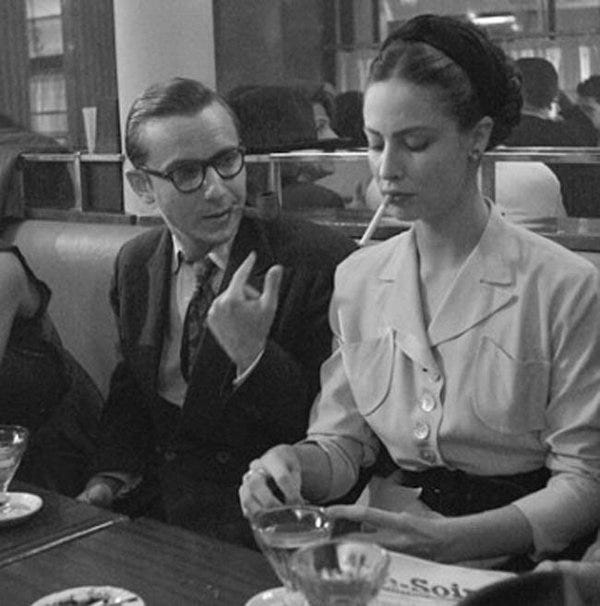
Where are the sexy atheists? It certainly doesn’t help matters that the most visible faces of the “new atheism” are overwhelmingly male, white, cisgendered, heterosexual, and — as far as is known — monogamous. It has been said that Eliezer Yudkowsky, the great AI theorist, is non-monogamous, but I haven’t been able to find any non-Wikipedian sources corroborating this fact. Theoretical physicist and atheist icon Lawrence Krauss is currently embroiled in his own sexual misconduct scandal, the results of which have yet to be seen, but apart from this there is very little evidence of any sex life among the so-called new atheists. Seriously, just try to engage in a sexual fantasy about Sam Harris and keep it from devolving into a tense debate about the existence of free will or Islam’s espousal of violence. I bet you can’t.
Meanwhile, our “sex rebels” are often less antagonistic towards traditional religiosity than one might expect. Belgian-born psychotherapist and renowned monogamy “skeptic” Esther Perel identifies closely with her own Jewish origins — at least on a cultural level. Sex columnist Dan Savage describes himself as “culturally Catholic.” The self-described “conservative” gay Catholic stoner journalist Andrew Sullivan is profoundly religious , and yet somehow in his recent collision with the decidedly secular Sam Harris and David Frum in Washington, DC he stood out as the outspoken champion of sexual liberation of the bunch.
And then of course there’s the Marquis de Sade of the soccer-mom set, E.L. James, progenitress of the Fifty Shades franchise. While the author herself has said little about her own religious beliefs, this souped-up caricature of Biblical domesticity — with the requisite fixations on virginity, discipline and dystopian surveillance — is a direct product of the Twilight universe dreamed up by the devoutly Mormon Stephanie Meyer. It seems there’s not that much daylight between magic underpants and nipple clamps.
International surveys of sexual satisfaction — as unreliable as such surveys are — also suggests that widespread atheism is bad news in the bedroom. According to Durex USA’s most recent international survey, the world’s most sexually satisfied country is the spectacularly religious Nigeria, with heavily Catholic countries like Spain, Italy, Brazil, and Mexico (and staunchly Orthodox Greece) in hot pursuit. Among the world’s most atheistic it’s a mixed bag, with Czechs and Swedes reporting relatively high levels of sexual satisfaction while overworked and undersexed Japan gives every appearance of a country in the midst of a national nooky strike.
It turns out it’s us atheists who are the real prudes.
Does this mean that a good sex life is predicated on a belief in unfounded bullshit or at the very least a fetish for the traditions and iconography of one or another Bronze Age religion? It surely doesn’t, but it is worth examining what it is about religiosity (or at least pseudo-religious cultural affiliation) that seems to result in higher levels of sexual satisfaction.
Sex, it has often been said, is a bellwether for psychological well-being, and on that front it’s been well attested that people who are religious (or at least follow some sort of religious practice) appear to be happier and longer lived than those who don’t. Are they having more sex because they’re happier, or happier because they’re having more sex? It’s hard to say, but it does appear than by jettisoning religion — and anything that stinks of religion — we atheists have lost something vital to our sense of satisfaction, some sort of élan vital that post-postmodernists like Jordan Peterson (who seems to adhere to some sort of lazy pseudo-Christianity) are now trying to breathe back into our world.
In his 2011 TEDGlobal lecture entitled “Atheism 2.0” the author Alain de Botton argues that the western world has “secularized badly” in its stark partitioning of all things religious from all things secular, and advocates a new form of secular society that incorporates religious icons and traditions so as to satisfy our fundamental need for connection, ritual, and transcendence. It’s an argument that to me borders on the obvious, but I have yet to meet a convincing description of what such a society might look like. Likewise, Harris makes a compelling argument for dogma-free spirituality rooted in mindfulness practice, but likewise gives no hints as to how society as a whole might be optimized so as to maximize human contentment— beyond simply having everybody meditate for an hour a day.
As for sex, none of the straight white dudes that dominate new atheist discourse seem to want to talk about it. The only time I ever heard Sam Harris talk about non-monogamy (in one of his Ask Me Anything episodes, I think) he seemed to dismiss the idea as unworkable for 99 per cent of humanity. (Sam, if you’re reading this and take issue with my characterization of your views on this topic, please let me know.) Meanwhile, the nouveau traditionalists out there — the Jordan Petersons and Ben Shapiros of this world — seem to think the answer lies in a return to the old ways of doing things.
I suspect the problem lies in the fact that while western societies are increasingly purging themselves of their irrational belief systems, they have yet to cleanse themselves of so many of the unhealthy patterns of thought that are the product of 4,000 years of bad socio-cultural programming. Men — and yes, it’s still men dominating our global conversations about, well, pretty much everything — are terrible at talking about sex, because men tend to view sex in mechanistic and performative terms all the while trying to avoid the topic lest it jinx their penile faculties. Need evidence of this? Go to a men’s support group — whether a religious or a secular one — and you’ll encounter conversations on virtually every sensitive topic (addiction, mental illness, financial struggles, relationship angst) but virtually no real honest sex talk. It’s as though the middle-aged men of this world are still waiting for their dad to sit them down and have the birds and bees talk.
We’re fucking clueless.
Is it fair to lay blame for our sexual hangups solely at religion’s doorstep? Probably not, although I can’t think of any institution that has done more historically to turn us into basket cases when it comes to this topic. That said, today’s standard-bearers for secularism and “progressive” culture generally don’t seem to be doing much to improve this situation. While western society has evolved in leaps and bounds on LGBTQ equality issues over the last fifty years, the same cannot be said about sexual liberation (read: promiscuity and non-monogamy) generally.
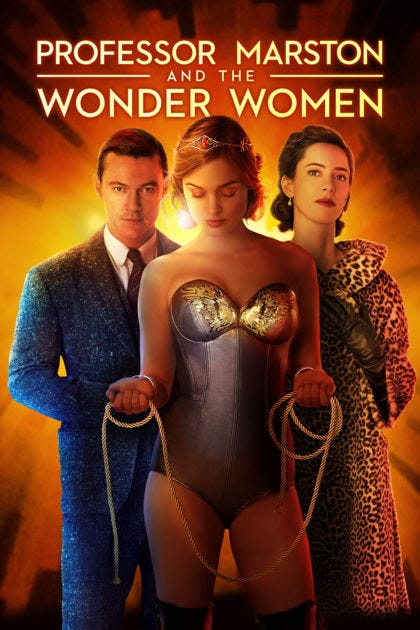
Those looking for evidence of how prudish we still are should watch the wonderful recent film Professor Marston and the Wonder Women, the deliciously erotic biopic centred on the life of psychologist and Wonder Woman creator Dr. William Marston, his legal wife and fellow researcher Elizabeth Holloway Marston, and their mutual lover Olive Byrne — who together with Elizabeth formed Dr. Marston’s composite inspiration for the world’s most iconic female superhero. The most striking takeaway from this thoroughly wonderful film is that in the over 70 years since Marston’s death in 1947, western society has barely budged in its stubborn attachment to monogamy. This nearly century-old love story is still practically as transgressive and iconoclastic as it was then.
I thought we secularists and progressives were supposed to be “ruining the traditional family” and all that. From my vantage point, our Victorian ideals about monogamous child-rearing couplings — albeit now expanded to include same-sex couples — are still alive and kicking. The slutty old-school Left Bank bohemian brand of atheism of Jean-Paul Sartre, Simone de Beauvoir, Anaïs Nin, and Henry Miller’s generation is nowhere to be seen. If we were supposed to be getting all this wanton promiscuous sex from rejecting God, shouldn’t we be having more of it?
Libertinism vs. puritanism—do they require one another?
Donatien Alphonse François, the 18th century French nobleman better known as the Marquis de Sade, was a far less interesting man than you probably think. The Christian Grey of the age of revolutions who was living in luxury in “prison” at the Bastille when it was stormed in 1789 (and among its few actual inmates at the time) was certainly a libertine who liked him some kinky stuff — and authored some stunningly perverted “erotica” (if that’s what you can call his unfinished magnum opus, The 120 Days of Sodom, or the School of Libertinage), forever cementing his name into our language.
That said, the following question begs itself: would anybody pay the man the slightest attention were he alive today?
If the Marquis de Sade were living in 21st century France (or anywhere in the western democratic world) rather than in an 18th century European society still anchored in devout Catholicism and belief in the divine right of kings, he would probably be peddling his twisted tales of sexual “sadism” (which would probably be called something else) in the dark recesses of the Internet somewhere while arranging hookups on FetLife and other BDSM/kink forums. In other words, he would be among the many tens of thousands out there trying to get their rocks off while peddling their written work online. He would be just like this author — just a bit pervier.
This begs the further question: can one truly be a “sex rebel” in this world without a backdrop of puritanism to rebel against?
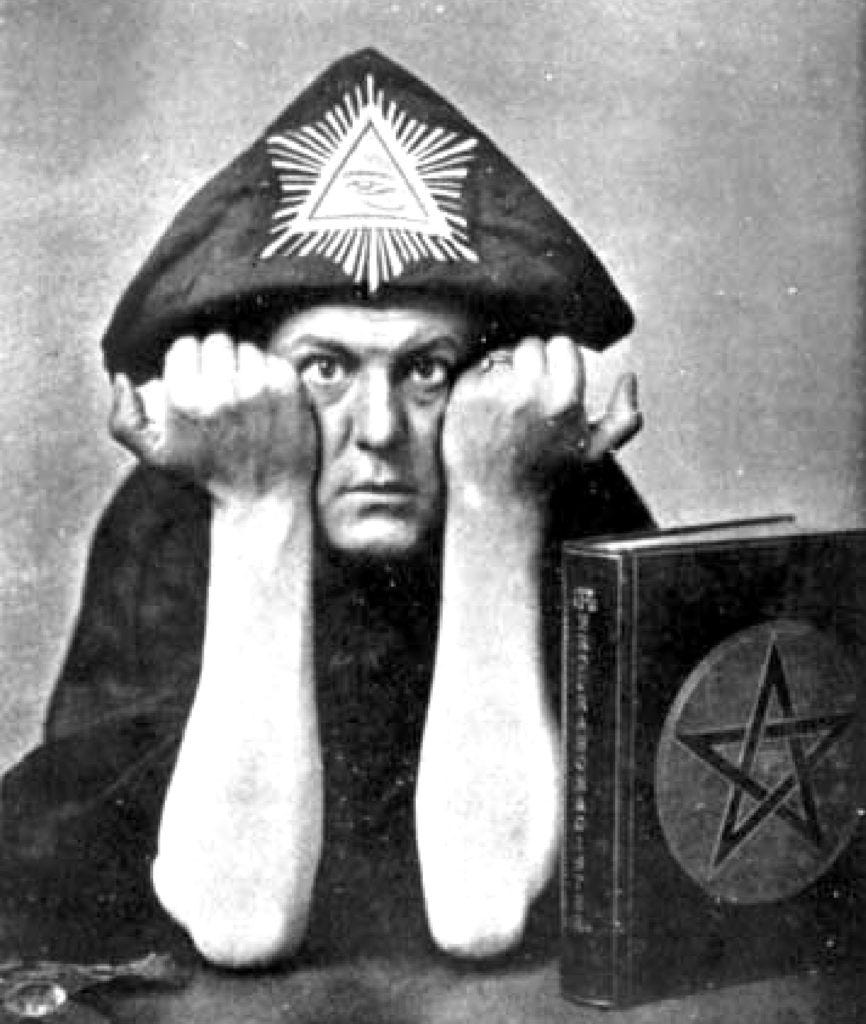
The Marquis’ early 20th century counterpart was Aleister Crowley, the English occultist, renaissance man, and notorious sexual libertine who fancied himself as “The Beast 666” and was tarred with the epithet “the wickedest man on earth” by the ever-hyperbolic British press. Like Sade, Crowley had plenty of puritanism in his background to rebel against, namely his uber-devout upbringing in the Exclusive Plymouth Brethren, the same repressive evangelical sect against which the philosopher and mystic Douglas Harding rebelled with great aplomb.
But unlike the proto-hippie Harding who sought quiet Buddhist-inspired contemplation in the Himalayan foothills, Crowley courted controversy — and thanks to an obliging scandal-hungry Fleet Street he got lots of it, and in doing so served as a fountainhead of inspiration for everyone from Anton Levey to L. Ron Hubbard to Mick Jagger and Ozzy Osbourne. But again, would anybody pay the guy too much attention were he alive today? No doubt many of the abuses committed against his devotees within his Thelema cult would have drawn ire and probably led to arrests, but in a jaded world that has seen the rise and fall of far more sinister cult leaders such as Charles Manson, Jim Jones, and David Koresh, Crowley would probably have been quickly discarded by the press once somebody worse came along.
In modern times, most of our more shocking, blasphemous art has come from artists who emerged either from deeply religious family backgrounds or from societies defined by religiosity and social conservatism. Georges Bataille originally intended to become a Catholic priest before renouncing his faith in the early 1920s. Extreme performance artist Ron Athey’s theatrical bloodlettings and other forms of ritualized self-torture hearken to his devout Pentecostal upbringing. Poet and filmmaker Pier Paolo Pasolini, whose 1975 WWII-themed redux of Sade’s 120 Days of Sodom still stands as one of the most shockingly perverted movies ever made (Salò, for those who can stomach it, is a remarkable piece of cinema that will leave you debating its merits for years thereafter — as well as marvelling at the fact that it got made at all), was the product of a staunchly socially conservative postwar Italian society, while transgressive Greek-American vocal performer Diamanda Galás and masochistic Serbian-American performance artist Marina Abramović emerged from similarly cloistered Orthodox Christian backgrounds.
In recent decades much of the world’s most extreme performance art has emerged from the ashes of the failed Soviet experiment, amid a Russian society increasingly gripped by political repression and church-sponsored social conservatism. Iconoclasts Maria Alyokhina and Nadezhda Tolokonnikova of Pussy Riot fame have displayed a willingness to suffer for their art (and their political views) up to and including incarcerating in Russia’s notoriously brutal prison system, while fellow performance artist Pyotr Pavlensky, whose extreme acts have included nailing his scrotum to the cobbles of Red Square and setting fire to the lobby of the FSB headquarters in Moscow, makes Ron Athey look like Mumford & Sons. Think you’re badass? Check out these Russian performance artists and get back to me.
Of course you don’t actually need a tight-ass religious background to become a rebel. After all, Hitchens was the product of what sounds like an open-minded, worldly Royal Navy background that fostered an early fascination with global culture and engagement with the world around him. That said, every rebel needs something tangible to rebel against, and perhaps more than any of the other so-called new atheists, Hitch felt deeply — in the same way that Pasolini empathized in agonizing fashion— for oppressed peoples around the world, and sought to empower them one witty riposte at a time.
But for those who were privileged to grow up outside the prison walls of religious fundamentalism, one has to be like Hitch and be an globally engaged rebel. As Gwendolen Fairfax astutely puts it in Oscar Wilde’s The Importance of Being Earnest, “On an occasion of this kind it becomes more than a moral duty to speak one’s mind. It becomes a pleasure.” I concur. Especially when it comes to the “pleasure” part.
But wait … there’s hope

So where will the next wave of “sexy atheists” come from? I think there’s reason to be confident that an atheist revolution of sorts is in the making in that most religiously draconian region of the world — the Muslim Middle East — as well as elsewhere in the Islamic world.
Among the many countries that Christopher Hitchens spent time during his life, there were few for which he expressed greater affection for than Iran, a country once upon a time synonymous with vineyards and steamy love poetry but since 1979 under the heel of a cabal of senile religious fanatics that in 1989 began the trend of issuing internationally binding death sentences for “blasphemous” art. In his numerous essays on the Islamic Republic of Iran, Hitchens highlighted both the awfulness of life in the country under the Ayatollahs, but also the tissue-thinness and patent hypocrisy of the theocratic regime, and the many ways in which ordinary Iranians routinely — even gleefully — flout the rules.
Elsewhere in the Islamic world signs are plentiful that a secular backlash is in the making — even in the six Arab countries — Kuwait, Qatar, Saudi Arabia, Sudan, the United Arab Emirates — wherein apostasy is still a capital offence. Even in Saudi Arabia, arguably the most religiously repressive country on earth, religiosity appears to be eroding, with a 2012 WIN/Gallup poll showing that some 19 per cent of Saudis interviewed said they were not religious and five per cent considered themselves to be atheists. In other countries such as Bangladesh and Indonesia, “out” atheists are ruffling feather and risking prison (or worse) for speaking out publicly against religion, while a growing number of Iranian women have taken to flipping the bird at the faith police by going hijab-free — both in public and on social media.
The same trend appears to be afoot — to an even greater degree — within Muslim communities in the west. A recent article in The Economist showed some 23 per cent of American “Muslims” no longer believe in the truth claims of the Islamic faith, although like their brethren in the Middle East and elsewhere most are yet unwilling to say so openly.
Meanwhile in the diaspora in the west, the ex-Muslim and secular Muslim reformist movements continue to grow in strength and energy. And unlike the tired old white male-dominated new atheism of a decade ago, this new movement is full of sassy youthful sex appeal, from Ex-Muslims of North America’s button-cute Pakistani-American founder Sarah Haider to the dishy, telegenic fashion plate named Maajid Nawaz, a former radical Islamist who is now the most visible face of the Muslim reform movement.

There is depth on this bench to be sure. Iranian-born founder of the Council of Ex-Muslims of Britain Maryam Namazie has championed virtually every anti-Islamist cause out there (while simulataneously taking Harris and others to task for their at-times clumsy critiques of her former faith), notably posing topless along with other activists in a show of solidarity with Egyptian atheist blogger Aliaa Magda Elmahdy who notoriously did the same in Cairo and had to flee to Sweden due to very real death threats. Imtiaz Shams, a Saudi-raised Brit who founded the group Faith to Faithless aimed at illuminating the path out of the Muslim faith, refers to himself as a “cultural Muslim” but at the same time helping build online and concrete cultural space for Muslim apostates at home and abroad.
Any western secularist looking for a worthy cause to fight — and a sexy one at that — ought to align themselves with the ex-Muslim movement. It’s happening right now, and it’s exciting as hell!
Prescription? Less Jordan Peterson, More Pussy Riot
There is indeed something tired and flaccid about today’s not-so-new atheists in the west. Today’s white western male atheists are far too comfortable and confident in their own views, and as such are losing their capacity to inspire. They’ve also, frankly, lost touch with that very wellspring of human vitality: sex and eroticism.
There is indeed something profoundly “spiritual” about human sexuality — it is a “super-stimulus” (to paraphrase Rebecca Goldstein) in the same way religion, and one that, like religion, causes us to engage in truly irrational behaviour. Perhaps this is the reason why people like Harris and Dawkins tend to avoid the topic unless it’s couched in a discussion of evolutionary biology. On this front perhaps it will be Egyptian bloggers, underground Iranian filmmakers, and Indonesian skatepunks who will save us from our malaise. Much as rock ’n’ roll has largely gone limp in the west, the same could be said about sexual liberation generally.
The next sex, drugs & rock ’n’ roll revolution will be brought to us by the Third World thanks to their seething masses of angry youth. Maybe demographics have doomed the west to be followers in the next wave of global social upheaval. Eventually the yoke of Islamism will have to break once nonbelief reaches critical mass in places like Egypt, Saudi Arabia, and Pakistan. The combustible ingredients are all there. It just requires ignition.
What can we do here? Well, we can stop taking our advice from people like Jordan Peterson, for one. Yes, we’re in the midst of a crisis of masculine identity in our culture, but that doesn’t mean we need to fish for paper-doll dress-up clothes in the cabinet of centuries past. Yes, we men have lost our balls, but those balls are not to be found in age-old mythology or Jungian pseudoscience. Nobody exemplified testicular fortitude more spectacularly than old Hitch, the man who categorically trashed the myth that there are “no atheists in foxholes.” He followed the good fight whenever it went, forever the swaggering Muhammad Ali of freethought. We could all stand to follow his example.
We need to be more like Pussy Riot — throwing tampons in the faces of Russian Orthodox priests, or like Aliaa Magda Elmahdy — flashing our boobs at mullahs, remembering that acts like these were just as dangerous in the western world not that long ago.
AND….we need to keep hacking away at the taboos that persist in our own society. I suggest we start with monogamy. And bisexual erasure. We’re still puritans when it comes to how we think about sexual partnering and relationships, preferring to cheat on our partners and get divorced to making a good old college try at the admittedly challenging endeavour of balancing multiple relationships.
The sexual revolution of the 1960s is far from a done deal, and in some ways we’ve arguably backtracked on that conversation. While we’re miles ahead of where we were on many issues, most notably sexual assault, consent, and LGBTQ acceptance, we still have a veritable mountain of sexual hangups and neuroses that we have yet to unpack. It seems to me that a joyful (albeit better informed) return to the ethos of sex, drugs and rock ’n’ roll is what’s called for at this point in our history. We needn’t replicate the armies of zombies with flowers in their hair letting their children wander naked in traffic to recapture some of that old spirit.
We can do it better this time. And we can do in a spirit of planetary citizenship, with sex rebels and joyful apostates from Cairo to Jakarta to Jackson, Mississippi linking arms (and flashing boobs) in solidarity.
